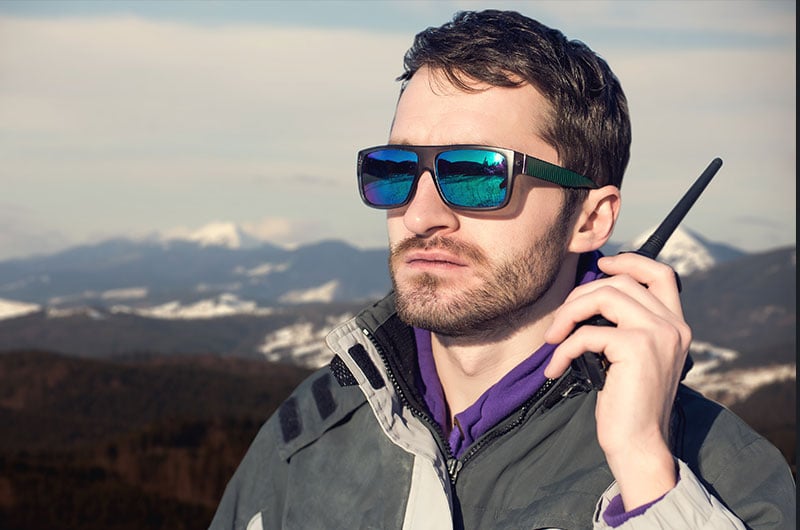Amateur radio, otherwise known as ham radio, is a term that developed in the 19th century in the early days of radio broadcast. So what does ham radio stand for? There are a few theories on the origin of the term, but the most credible suggests that the term is an acronym for the first amateur wireless stations operated by some amateurs of the Harvard Radio Club. They were Albert Hyman, Bob Amly, and Poogie Murray - thus giving us “HAM”. Like other wireless technologies, ham radio uses the power of electromagnetic radiation to send voices, Morse code, and digital data with the help of transmitters, receivers, and antennas.
HAM Radio Users
Radio Amateurs (aka "Hams") come from all walks of life and use radios for a number of different things, including personal recreation, emergency services, contesting, radiosport, and education. Hams have been around for years, as have CB-ers and other radio enthusiasts. But over time, many of the bands that these folk use for communication have been plagued by difficulties. Noise generated by wall adapters, broadband running over power lines, along with other sources, have made the shortwaves, in particular, a challenge on which to operate.
The proliferation of home devices, increasing the need for more power outlets to charge or run them further complicates the situation. All of these factors add up to a lot of background hash - this has become a significant issue for many radio users using ‘traditional’ radio.
Coupled with the fact that the usual method of long-distance propagation for signals for these guys (typically via the ionosphere) has not been ‘playing ball’ over recent years, it's sad to realize that many have been curtailing their radio hobby activities or even giving it up altogether.
How Radio Enthusiasts Use Zello
Zello however is proving of great interest…
While still using radio in some form (cellular data or WiFi), Zello is acting as a kind of ‘platform’ upon which radio enthusiast groups can build their own communities.
For example...
- CB-ers can create a set of Zello channels for CB-style usage, with their own brand of language
- Radio Amateurs have made discrete channels open to licensed Hams only - they run exactly along the lines of worldwide Amateur protocols
- Radio Clubs have created private channels for members only, and so on
One of the most successful network of channels has been one that has deliberately taken an ‘open’ ethos to radio hobbyists from all backgrounds.
The ‘Network Radios’ main channel, https://zello.com/networkradio, was created by Karl Hobson (G1YPQ) in January 2018. It has seen phenomenal growth, with around 8500 subscribers, and over 4000 of those users were trusted within the last 9 months! In addition to the main channel, there are six other related Network Radios channels to choose from. You can find and add any or all the channels by searching with the keywords “Network Radios” in the Add Channel function.
Channel subscribers are mainly made up of licensed Hams (around 90% of users) operating with Amateur protocols, but the channels welcome radio hobbyists of all backgrounds.
The remaining 10% or so unlicensed folks are encouraged to use a call sign of their choosing. You can also register for an NR callsign (e.g. NR 234) to use with the channel - a register is kept by the admins and moderators to avoid duplication.
Why Radio Enthusiasts Use Zello
The Moderation team on Network Radio channels have a mix of thoughts as to why the channels are so popular…
- Users are universally expected to be polite, using Amateur protocols with callsigns of some kind
- The ‘inclusive ethos’ means there is little elitism present, something often found on Amateur Radio bands
- Most users are ‘on board’ with that ethos, and work well to protect it - it’s not just down to moderators to police the channels - users report issues regularly too
- Bad language is stamped on - you can expect to be bounced or blocked quickly
- Even if you ‘misbehave’ overnight, the admin team listens to recordings on the next day and can block people retrospectively
- Although an 18+ label applies for speaking, the content is deemed ‘family-friendly’ and under-18s are often listening
- The Moderation team is highly motivated and committed to making the channels work.
There are doubtless other reasons too, but when a family feels it’s OK to have these channels on in the house or car, word-of-mouth seems to spread that something good is happening in Zello. It encourages people to listen in and maybe even join in the talk too!
What can we learn from all this?
Zello channels already work really well for all kinds of private uses - but once you are in the public domain, you really need a committed moderation team to run them to the highest standard.
Moderation tools are something traditional radio is very poor at, but at which Zello excels.
I know the Network Radios guys have lots of ideas to offer the team at Zello too, so maybe some future improvements to the platform may even come from users themselves. The folks at Zello are very open to that, I know!
But perhaps the most important thing to learn is simply this: If you use Zello channels with a modicum of respect, you will in all likelihood get respect back, and that communicating via speech is one thing that all humans excel at!


